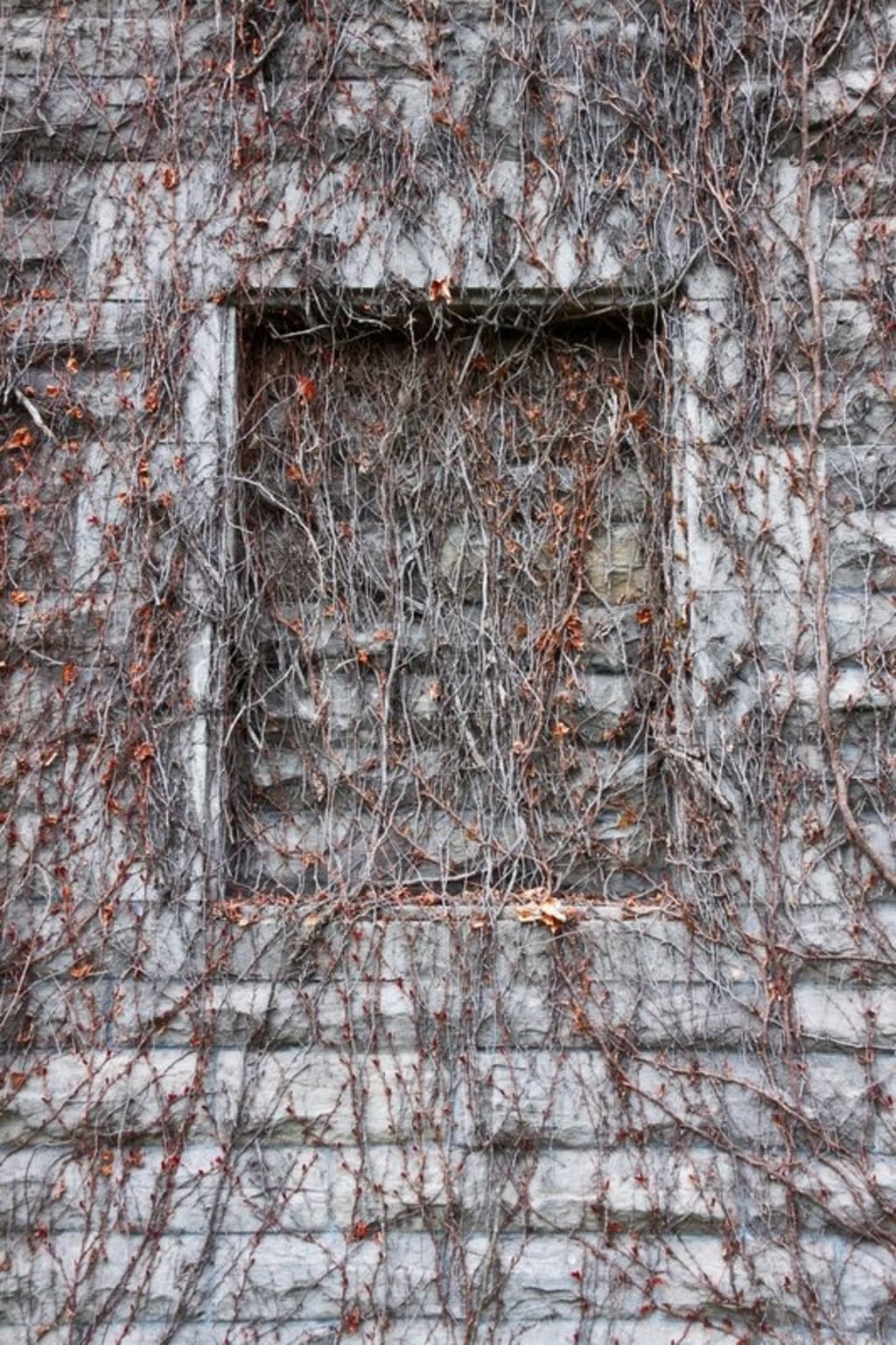
The outside world was unknown to her, but she could see a glimpse of it through the window in his room. It was a small window, forbidden by law and, unbeknownst to the local authorities, hidden behind a craftily hung picture and its frame. But the window, the last of its kind, could not be easily hidden or forgotten about; the light had bled through from behind the chipping brown frame, overflowed over the stale gray walls and spilled onto the cold concrete floors of the upper room. Its warmth managed to seep through the cracks in her ceiling, dripping on her pristine white walls and mystically wafted through her room. It called to her. The light had only whispered to her at first, in a voice that was almost completely inaudible. It scratched at her ears, which prompted her to send for a doctor. He came, the only doctor who dared venture into their side of town, and determined there was nothing wrong with her ears, but she was a bit malnourished. He, through the door, as he naturally could not go inside her complex, prescribed her a hot meal and a bath, but could not provide either to her. So, she went back to her thoughts for several days, forgetting about the itching for a long time.
Then, that December, in the year she would have turned 13, had she known what or when her birthday was, she heard it again, far more loudly than she did before. Her naturally inquisitive nature had grown significantly in that past year and trusting it taught her to survive in that building alone. But the one place she had not dared to venture was the upper room— the one right above hers. She’d passed by it several times, sometimes leaning against the slate wall, feeling the vibrations of the noises inside. Months of deductions lead her to conclude what she thought was impossible: someone, or something, was living in there.
On that day, the little girl not only heard the light, but she saw it too. It was like water, and had dampened the space around the foot of her mattress. She’d been napping, one of her most frequented pastimes in the cold, dark building, when she felt a familiar sensation on her foot. At first, she ignored it, thinking maybe a rat had peed on her or she’d been bitten by some sort of bug and now her foot was swollen. But when the sensation intensified and the sound of her name began swirling around the room, she abruptly sat up, unaccustomed to the sound to her own name or any voice at all. The building was normally so quiet, she occasionally wondered if she could still hear sound at all. Undoubtedly, she could hear the light calling to her. She arose from her bed and walked to the corner of her now dimly lit room where the light had apparently entered. There were no visible holes for such a potent light to have shone so vibrantly through; and yet it did, through what appeared to be a minuscule crack in the ceiling. Her curiosity lead her out of her unit and into the dark stairway. Her small, bare feet echoed through the deserted building as her hands trailed the wall, keeping her balanced on the steep stone steps.
She’d assumed that for the past 5 years or so she’d been living there completely alone. She once had neighbors and parents and friends; all light bearers in both personality and function. And though she was not like any of them, she did enjoy their company and the warmth they brought. But when the sweeps began, when she was about eight or nine, they were taken, along with any other light bearers in the city— or so she was told. She herself was never a bearer of light, and as such, was left to die in that abandoned building alone. And yet, she lived. Long after the building had been forgotten about and her city had been overrun by the Keepers, the girl survived on the plentiful pantries her neighbors had left behind. She rationed— since the concrete doors had been bolted shut from the outside years ago— unsure of how long she could live this way, but unconcerned all the same. She was content.
The door was always slightly ajar, the harrowing sounds from within always narrowly escaping into the outside. It seemed that no one ever went in and no one ever came out and yet she was certain that the sound she could hear inside was breathing. It was similar to hers: raspy and short breaths desperately trying to force what oxygen was left inside of them. But these were more prominent breaths, much older and more desperate maybe. For a moment, she contemplated going back to her unit and pretending the light did not exist, but she could see the light from the bottom of the door and felt compelled to follow it.
From the outside, the unit looked like any other. It, like the rest, was cold, dark and lifeless. Its heavy wooden door hadn’t been moved in ages and the dust and cobwebs had accumulated in the space where it was left open. But the inside was different. Upon following the light and entering, the girl discovered she did not have to feel her way around the dwelling; she could see. It was a nice space with wood tables and chairs sitting upright in their correct places. The shelves and cabinets and cupboards hadn’t been raided and food wasn’t thrown about. The air didn’t even have that stale smell all of the other units had. It was fresh and clean in that space; it felt like a different world entirely.
She didn’t see him at first. She was far too entranced with the space on the wall that the light poured out from. But when she did see him, he startled her. She hadn’t seen another person in years and she definitely had never seen one that looked like him. He laid on his bed almost lifelessly, consuming as much oxygen as his frail body would allow. His eyes were open, but only barely, and he spent all of his days staring up at the ceiling. He’d been there for as long as she had, mourning the loss of his children like she mourned the loss of her parents. The emaciated, old, gray man was similar to her in a lot of ways. He could not bear light either and had survived without any clear reason of how or why. Contrarily, he was ready to die. He’d been in that spot, seemingly, for years, hoping that each day would be the day he closed his eyes and did not reopen them, but that day seemed to be avoiding him. He knew of the light. He knew one day someone would come to see about it. But he never expected a little girl, a child, to walk into his room and non-verbally inquire about it. They stared at each other for a long while, before wordlessly agreeing to not harm one another and going back to their interests.
She followed the light to the picture and its frame on the wall. It was positioned much higher than she could reach, but that didn’t stop her from standing on the tip of her toes and still trying, earning several splinters in the process. With raw fingers, she finally tried an alternative method and pushed the chair from the dining room against the wall. It was a bit rickety, but she balanced herself on its opposing edges and carefully removed the framed picture. The window had not been forgotten, it was found. The chipped concrete edges told the story of the once poorly hidden window. While all of the others had been completely removed—the glass knocked out and the hole filled in—this one was still intact, like someone wanted it to be found. Loose pieces of concrete held on to the wall and laid limp on the floor around her chair. Had the old man found the window and chisled it out himself? If so, why had he chosen to stay there and die a slow and lonely death, instead of escaping into the outside world?
She’d never been outside. She couldn’t recall ever having seen a window either. The window ban had begun shortly after her birth and from the day of her arrival she’d been confined to her building. Her small fingertips trailed the warm, dusty glass. She could only make blurry images out of the objects below, but the colors were vibrant and inviting. She gasped in awe at the moving picture; how lovely it must be to live a free life far away from the gray building she lived in. Desperate to see more, she tore a piece of her shirt and hungrily wiped the dust and debris from the window. It wasn’t clean, but at least she could see. It was beautiful; shiny cars floated through the well lit streets. People of all different shades, colors and ages walked carefree in the colorful urban background. Buildings, taller than hers, sported exciting and blinking signs, though she could not read any of them. The life below was far different than the life she lead inside. She’d always figured it looked the same inside as it did out, but here was a contrary idea, living and breathing in front of her. Her grin exhausted her cheeks as she pressed her face against the glass; she was entranced in the world below and so desperately wanted to be completely consumed by it. She unlatched the lock and attempted to raise it, but it had been cemented shut long ago. She rifled through the old man’s drawers and found a screwdriver, with which she attempted to pry the window open. It held tight and refused to budge. Defeated, she slumped against the old man’s bed. The two sat in silence for a few hours, with only the sound of the old man’s breathing to accompany them.
Her thoughts and imaginations gave her the most comfort. While she sat, and considered going back to her room to forget about the window, she imagined what the people below must be doing. She was too young to remember dinner time and which foods fit which time of day best, but she found baked beans especially delicious before bed. She’d never tried them warm, but she knew that was the traditional way to eat them, and she imagined the people below would have heat and electricity and would be eating cans of warm beans right then. She was growing sleepy and would have loved a can of beans, but she’d ate her last can last month and the old man had none in his cabinet. His room possessed a heaviness that lulled her into a deep sleep, a sleep she had not achieved since her parents had been taken. When she awoke, the window had been covered by the picture again and all four of the dining room chairs were missing. She looked to the old man who seemed to be in the same spot as he was yesterday, still only barely alive. It was odd, but his room was odd, and she chose to ignore it. She approached the window with much eagerness, using the screw driver to lift the picture from its nail and pulling it to the floor. Without her chair, she had to stand on her tip toes to see outside, but it was a beautiful sight from any angle. The sun had begun to rise and people were beginning to emerge from their homes. The pink, orange and blue sky lit up the old man’s entire room. Her hand touched the glass, longing for it. She felt a heat beginning to rise in her chest, an intense, ruling heat that begged her to find a way to reach the outside. Why, she thought, could they live such a beautiful life while she was confined to a concrete prison? She looked to the old man and having found neither approval nor disapproval in his gaze, she began throwing heavy objects at his window. At first, they were small objects: a stapler, shoes, a waste basket and a game board. And when those did not work, she rifled through his drawers again and found a cast iron pan. Near it was a step ladder, perfect height for a 13 year old child. She positioned the ladder underneath the window and drug the pan into the room with her. It was heavy, extremely heavy, and difficult to hold over her shoulders, but she figured she could position it at the base of the window and forcefully shove it into the glass enough times to break it. At first, it seemed as though her efforts were in vain. The glass did not budge and she was exhausted. But when she began to hear a soft cracking emitting from the glass, she was recharged and began vigorously ramming the pan in to the window. The cracking grew louder to the rhythm of the pan banging against the glass window until finally, it gave sending gas flying everywhere and the girl sliding over the edge over the window under the weight of the heavy pan.
Twenty years ago today, the world collapsed under the weight of its own voracity.
The unwritten law exemplified the idea that more was always better. More money, more food, more power; more of this thing or that thing— the average individual was not easily appeased and unchecked appetites lead the world into darkness. On that day, Black Noon as they’d taken to calling it, everything was shut off. Their electricity, their water, their electric cars, all of it was gone. Naturally, they flew into ravenous rages, looting and fighting, expecting that when everything was normal again they would be on top this time. They treated Black Noon like it was a reset button, giving the lowly an opportunity transition into a space within the upper echelon. But this was not so. Things did not return to normal and when looting and rioting grew tiresome, they learned to survive. Some, chose violence as a tactic, killing and stealing to provide for themselves and their loved ones, making the outside world a very dangerous place to be. Ironically, the danger did not discourage theft or violence, in fact, it encouraged it. While they’d adapted to the knowledge that the world would not ever be normal again, they still longed for an elite status. The richest among them were those unafraid of the outside. They’d stolen from markets and police stations and built store houses that they controlled by force. And while the meekest and most humble people would simply submit to the authority presented before them, it still seemed that daily a new elite would rise and kill the former. With no regulation, bodies piled in the streets and this went on for quite some time.
During this time, a man who was once highly influential and very powerful lived in a one-bedroom apartment on the lower east side with his brother and his brother’s wife. While the man took no interest in becoming a local kingpin, he greatly desired to establish order and rule within his city. He understood that the world itself was an issue to be dealt with by its individual governors, who were likely experiencing their own unique feelings, but he would deal with that if the problem presented itself as such. For weeks, he met in secret with his friends who once held high societal and governmental positions and together they reached an agreement. When examining the flaws within their world, they decided the most detrimental attribute society possessed was covetousness: the desire for things one did not need, or even want, simply because someone else had them. And while over time, they sought ways to rectify this issue, the man’s brother and his wife created a remedy to a similar conclusion. They too saw the issue as being covetousness and over indulgence, but together, they decided the best solution was to pool their resources and live as a unit with others around them. The people in their complex were a largely friendly group and even before Black Noon, they had been content with their humble dwelling quarters. For years, the plan worked and in time the complex was a thriving haven. Confined to the safety of the building, they discovered a radiant power within them. Some could create blooming produce with the touch of a finger and a bit of light. Others could move objects with their mind. But almost all of them—save for an old man who was unfriendly, but overall unproblematic— could emit light through their skin. So when the man’s brother had managed to seize power and began his tyrannical cure for covetousness, the community within was not afraid. All that they needed was within those concrete walls. Over time, the couple even had a child, a little girl, named Elizabeth.
The key principle of the cure was based on the phrase “a window is a portal to the outside world.” The tyrannical brother of the man who saved dozens found that phrase to be detrimentally true. And so, he thought, what better way to change the world, than to close a portal? If people could not see what was out of their reach, they would not want it. They began sealing windows throughout the city and in neighboring towns and soon, the idea spread to the entire world—the man found the chiefs and governors of the worlds major cities far more reasonable than anticipated. The solution was met with anticipated resistance and so he created and employed the Keepers who enforced the curfew and monitored the outside activity of all citizens. Keepers were often violent and crafty, yet for several months after their windows had been taken, the people inside the apartment complex were safe and joyful.
The problem began one August, approximately 8 years after the rich and important man had elevated to the status of Governor. He had successfully changed much of the known world, and yet he was dissatisfied. Maybe, he thought, he needed a higher rank, a more totalitarian position. Then he received a letter. The letter had no name or sending address on it, but it divulged the location of a small tribe of people who could do miraculous things. The writer insisted the people could be of great use to the Governor, however, he requested that he and his family be left in peace. Recognizing the address, the governor quickly dispatched his Keepers. The people were dragged from their homes and the light they emitted, the most powerful energy source in the world, was used to power the city. The local socialites returned to their upscale parties. The lower class, now more heavily oppressed, were hidden within their abandoned walls, frequently dying of starvation and sickness. The governor, having discovered something priceless, was named Unilateral Totalitarian Governor of the World, the highest possible title. The little girl and the old man were left to die in their apartment as the only two who were of no use. The last memory from that day, possessed by the 8 year old child, was of her father, his light flickering profusely, being dragged away from her.
The girl was saved by her pan becoming tangled in a near by tree. She carefully climbed down and surveyed the world around her. It was glamorous and beautiful. Vibrant and sweet smelling trees bloomed every where. Posh citizens bounced down the streets in their floating cars. The smell of rich foods populated the air. The window was only a glimpse of what luxury surrounded her and she desired more of it. Her bare feet wandered across the street to where a woman was feeding a small dog. She wore a bright green bubble coat and even brighter purple pants. Her hair was the shiniest and bounciest red hair the girl had ever seen. She was covered from head to toe in diamonds and pearls, refracting the light so much, it almost blinded the girl.
“I’m lost,” she lied to the woman, determined to never go back into the building again.
“Aw!” The woman said in a sympathetic whiny voice, “You’ll be mine then! I have a lot of things, but not a child! My friends will be so jealous!”
And she grabbed the little girl’s hand and took her home.
Today, in a prison somewhere far from the city, there is a widowed man. He could once produce light with his body, but it constantly flickered and he never quite understood why. Having had years of solitude to consider it, he finally reached an internal understanding: there was only some light within him. And when that ran out, he was just as bad as the rest of the unlit world. His wife glowed vibrantly and his love for her caused his light to shine, but his jealously of her caused his darkness. He loved his community, but he often wondered why he had to suffer when his brother could live so lavishly. He loved his daughter, but she, the non-glowing baby, was a reflection of the darkness within him. And on the day he betrayed his entire community by exposing their abilities to his brother, he changed all of their lives for the worse and permanently dimmed his light. He frequently thought about the monster she must be or would be becoming if she was still alive. Though she was half her mother and half him, she’d never glowed once. So, he figured, there must be no light in her, no good thing about the child that was worth saving. Her abandonment was probably for the better. He shuddered to think about what intense vengeance could lie inside of her 13 year old body.
About the Creator
NatahYah
Yod.Hey.Uau.Hey. | YA Fiction | Poetry | Historical Fiction | Word Art
Check out my small business: AncientPathSE.com






Comments
There are no comments for this story
Be the first to respond and start the conversation.